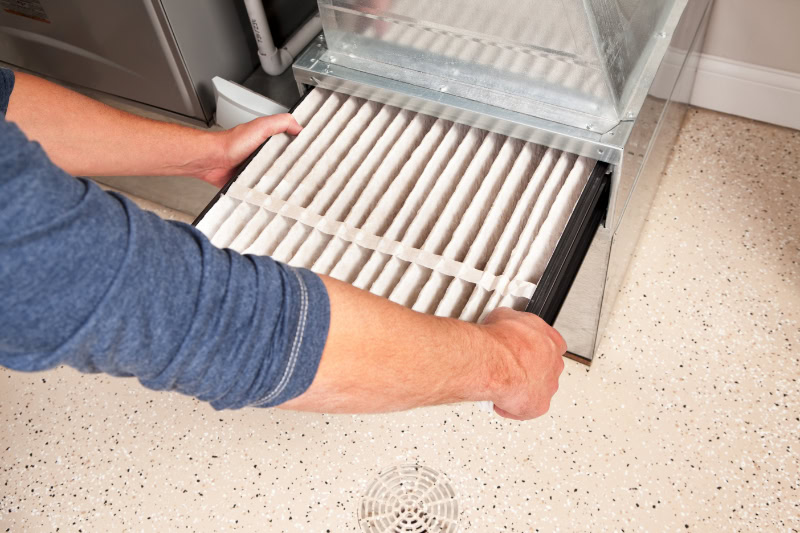Everything You Need to Know About HVAC Filters

HVAC air filters are not flashy. They have no moving parts, and they look a little flimsy when compared to the shiny hunks of steel housing your heating and cooling systems.
However, appearances can be deceiving because your HVAC air filter is a mighty contributor to:
- Your home’s [indoor-air-quality].
- Heating and cooling efficiency.
- HVAC system longevity.
Yes, that box of cardboard and paper-thin pleats is essential for maintaining comfort in your Alabama home.
Maintaining Your HVAC System
At Southeastern Cooling, we recommend you give your HVAC a little TLC by getting to know its air filter. Make it a point to understand what an air filter does, how often it needs replacement, and what type is appropriate for the heating and cooling unit in your Headland, home.
When you schedule spring and fall HVAC tune-ups with us, one of our capable Southeastern Cooling technicians will inspect your air filter for dirt and replace it. However, if your filter needs more frequent replacement, the least expensive strategy is to do it yourself.
As an HVAC owner, you have unlimited access to your heating and cooling system. You can inspect your air filter monthly and replace it when needed.
You should check your filter monthly and replace it if it appears dirty. Your system operating instructions provide more guidance on which filters to use.
Does My HVAC System Really Need a Filter?
Air filters are a barrier between polluted air and the system, appliance, or vehicle they protect. They are the first line of defense against particles like dust, pollen, and pet dander that would otherwise enter your HVAC unit, travel through your ductwork, and contaminate the air in your living space.
Instead, air filters trap the contaminants, providing several benefits:
- Cleaner Air: Filters enhance indoor air quality (IAQ), giving you a healthier living environment. That is especially crucial for household members with allergies or other respiratory problems.
- Protected Equipment: Filters prevent dust and dirt from building up on components and causing breakdowns. A cleaner HVAC unit tends to last longer than a dirtier one.
- Enhanced Efficiency: Your HVAC system operates more efficiently with a clean air filter. A clogged filter can restrict airflow and unnecessarily stress your HVAC unit. Equipment struggling to overcome airflow restrictions consumes more energy, which increases your utility bills.
According to the U.S. Department of Energy (DOE), replacing a dirty filter with a clean one can lower your air conditioner’s energy consumption by 5 to 15 percent.
The Dangers of a Dirty HVAC Filter
Running your HVAC unit with a dirty filter or without a filter is one of the fastest ways to lower air quality and potentially harm your equipment. Here is how a clogged filter can affect it:
- Damage: A clogged air filter does not capture dirt well, while a clean filter does. Some debris may escape capture and settle inside your HVAC unit, clogging the operation and possibly causing a breakdown.
- Ductwork: Particles can accumulate in your ductwork and compromise indoor air quality.
- Airflow: Restricted airflow forces your HVAC unit to work harder, possibly overheat, and break down.
- Health Risks: Allergens that escape a dirty filter, flow through your ductwork, and circulate throughout your Henry County home can trigger allergies and respiratory issues.
Choosing the Right Filter
Air filters vary in size, materials, thickness, and Minimum Efficiency Reporting Value (MERV). The MERV rating indicates how well a filter traps small particles. Most residential heating and cooling units use filters with MERV ratings from 8 to 13.
At Southeastern Cooling,, we can recommend a filter compatible with your heating and cooling unit. For guidance on filters, check your HVAC system owner’s manual.
Here is a quick guide to filter composition:
- Fiberglass: Filters made of fiberglass are affordable but less effective at trapping small particles. They typically need to be replaced more frequently than other filters.
- Pleated: These filters are made of cotton, paper, or polyester. They are more efficient than fiberglass filters at trapping dust and allergens.
- HEPA: These filters capture nearly all particles as small as 0.3 microns. They are ideal for allergy sufferers but may restrict airflow in some systems.
- Electrostatic: These washable, reusable filters attract and eliminate particles with an electric charge.
Find and Replace Your Air Filter
Always turn off your HVAC system before replacing the air filter. The filter location depends on the type of your HVAC system. It typically sits inside the return air duct of your furnace or air handler behind an access door. Consult your owner’s manual for specific instructions.
Before removing the old filter, note which direction the arrows on it point. Typically, they point toward the blower system in your HVAC. Remove the old filter and install the new one. Close the access door and turn the system on.
Call Your Local HVAC Experts Today!
Our expert team at Southeastern Cooling can assist with all your heating and cooling needs, whether you want advice about the HVAC filter in your Headland, home or other HVAC solutions. We are here to help! Call us at 334-751-2015 or request service online.
NEED HVAC SERVICE?
Contact the experts at Southeastern Cooling, Heating & Plumbing.
Call us at 334-792-1761!